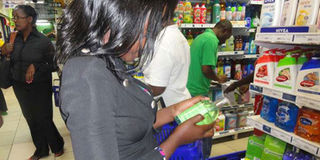Drug agency bans chemicals soaps in health risks debate

A customer buys antibacterial soap at a supermarket in Nairobi. Food and Drug Administration (FDA) has banned antiseptic soaps that contain harmful chemicals. FILE PHOTO | NATION MEDIA GROUP
What you need to know:
- Several peer-reviewed studies have raised questions about the safety of the chemical — Triclosan — and others implicating it as a cause for cancer and male infertility.
- Kenyans interviewed by the Nation on Sunday admitted using both liquid and antibacterial soaps.
A number of antiseptic soaps that contain harmful ingredients could be banned after a US agency questioned their safety.
The Food and Drug Administration (FDA) - the American equivalent of Kenya Bureau of Standards (Kebs) - in a statement published on its website on Friday, indicated that over-the-counter (OTC) wash products containing flagged ingredients should not be on sale given that manufacturers failed to ascertain the safety of users.
The decision targets products containing one or more of 19 specific active ingredients, including the most popularly used ingredients – triclosan (liquid soaps) and triclocarban (bar soaps).
However, the move does not "affect hand 'sanitizers' or wipes, or antibacterial products used in health care settings".
Triclosan is common in Kenyan products including toothpastes and liquid soaps popular in laundry work, in which they are used with water and rinsed off.
In the statement, Janet Woodcock, M.D., director of the FDA’s Center for Drug Evaluation and Research (CDER) said: “Consumers may think antibacterial washes are more effective at preventing the spread of germs, but we have no scientific evidence that they are any better than plain soap and water.”
“In fact, some data suggests that antibacterial ingredients may do more harm than good over the long-term,” she added.
Neither Kebs nor the Ministry of Health had issued any statements clarifying the Kenyan position on the matter. Also, a list of the products has not been made available.
COMPLIANCE
The final decision comes after a debate that has been raging for years regarding health hazards associated with the chemicals.
In 2013, the body issued a proposed rule after some data suggested that long-term exposure to certain active ingredients used in antibacterial products could pose health risks, such as bacterial resistance or hormonal effects.
Manufacturers have been given one year to comply - by either removing the products from the market or reformulating them (taking out the harmful ingredients).
Some, for example Reckitt Benckiser, have already began doing so. The firm removed triclosan from three face washes.
Kenyans interviewed by the Nation on Sunday admitted to using both liquid and antibacterial soaps.
Nearly all of them said they hardly check the active ingredients used to make the products.
Martin Okeyo said: “As long as my pocket can afford it, I buy it.”





